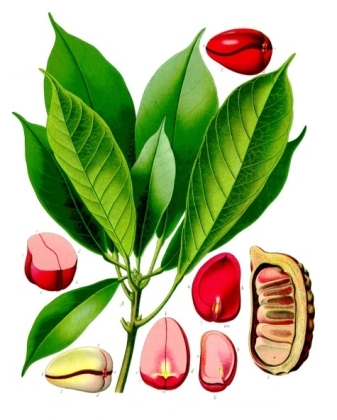
Here’s a piece I wrote about the ubiquitous use of kola nuts in Orisha tradition, specifically in Candomblé de Ketu. Please, let me know what you think?


Here’s a piece I wrote about the ubiquitous use of kola nuts in Orisha tradition, specifically in Candomblé de Ketu. Please, let me know what you think?

I wrote this to help folks getting involved know how to deal with taking a ritual bath, something that happens a lot if you get involved in an Afro-Brazilian spiritual tradition. I hope it is useful.
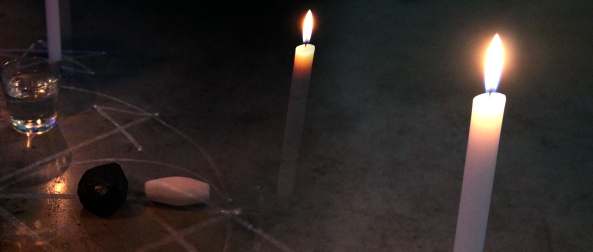
I’m attaching a longer piece I wrote awhile back about Umbanda. It’s kind of a religious rant that kind of just came to me one morning and, after some edits and additions, I hope it’s worthy of putting out there.
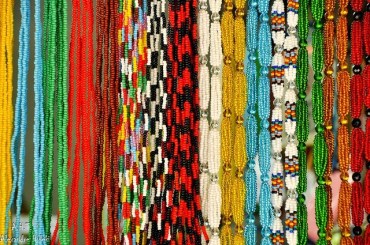
Here’s a piece I wrote about the use of beads in Candomblé and Umbanda. I could have gone on and on, but tried to keep it succinct and tidy so as to be usable to someone just wanting to know some of the basics of the ritual significance of beads in our tradition.
Hope you like.
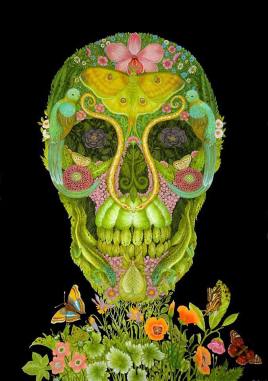
These are the days we sit between Light and Dark. In the world around us the season is turning from bright to dark with all hope that on the other side it turns from dark to bright. It is a threshold this moment. Same as any and every moment, so do we turn to go inside or turn to step out? Who stands at our door to come in? Who leaves us standing here? Life and Death, in the eyes of those made wise, are two sides of a swinging door. The living and the dead pass each other in the coming and going of this time; it’s a crowded thoroughfare, a lonely spot, with footprints fading under the press of ever more footprints. The earth now seems pounded, hard, and indifferent or is she dreaming, barely bothered by the footfalls above? In her time she sleeps, awakens; the living and the dead are all the same to her, all one in her turning, eternal embrace. Who says good-morning to whom? Who says good-night? Walking in this slanting Autumn light, itself like a door held ajar, with possibilities now adamantly foreclosed, shut off forever, yet still with others held open, desultory and begging attention. Who walks by silent on the journey? Who sings to those passing on? Who stands with a shaky hand held out? And who in such fear heavy times still finds courage to take hold?
A happy Day of the Dead to Everyone, living and dead!
(Gracias a Tino por el uso de la imagen de su cuadro fabuloso.)
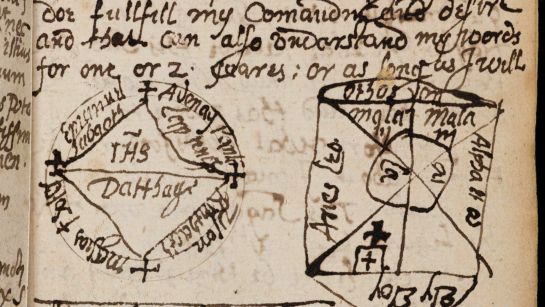
Lately, I have been feeling so much heavy stuff. I’ve been getting messages from so many out in the world that have just left me shocked, then angry, then feeling hurt and hopeless. From our president making friends with fascist dictators and coming home to, well, behave like a fascist dictator, letting us immigrants know that we are, in his eyes, less than human; to the Pope, who has again affirmed the Church’s policy of excluding women and gays from Holy Orders. I’ve also encountered harsh opinions in traditions closer to my own, a Nigerian babalawo held in high regard saying things like “lesbianism is futility.” I’ve just felt hate, disdain and judgment on all sides these days. And I’ve begun to actually feel that there may indeed be something wrong with me. Part of me keeps thinking. All these opinions come with an implied disclaimer, “It’s not my fault, not my opinion really, it’s just the way things are.” God, Nature, reality, Ifa, Orisha, Dharma…but not me, not my fault that you are a lesser being and thus I don’t have to accord you equal consideration, or any consideration. Not to be arrogant I let myself wonder, perhaps I am something lesser, a spiritual being who either by predestined choice before birth, poor choices in the here and now, or by supernatural disdain by mighty gods, is not equal to other, better, more healthy or holy souls out there. Maybe some souls really are just bad…our beings botched, lame, or defective.
Then a voice: “Spiritual racism.” She says. “Don’t be fooled.” She is little more than a pause in this line of thinking, a disruption, a questioning.
Suddenly, I am grateful to be botched. Son of an immigrant, mixed racially, impure not just genetically but also because of my sexuality that, according to so many spiritual leaders, is nothing but “futility,” I am destined to be a lonely soul wandering the afterlife in a bleak otherworld. I shall come to haunt the righteous. A hungry ghost, a creature from the bush bringing blighted crops, miscarriages and the misery upon the righteous citizens of New Gilead, New Yorubaland, or New Whatever-the-Fuck-land. Demonic. I am suddenly grateful that I never quite fit into any of the “Holy Orders” I love and to which I’ve dedicated myself. Not a perfect, 100% Orisha devotee (not Black enough, not strait enough, not born-and-raised-in-the-tradition enough, not initiated enough, etc. etc.), not a perfect Christian, (an unrepentant homosexual, a holder of heretical beliefs), not a perfect Buddhist, (eat meat, refuse to believe bad things happen to bad people for good reasons), and a bad gay, (I stay at home typing up rants about Voodoo when I should be out getting drunk waving a rainbow flag on this Gay Pride weekend.)
I see that I can choose to stand in a crossroads alongside an army of trickster souls, each of us rejected by dogmas, and each of us able to reject dogma that eats at our human dignity and drains life from the people through mystifications of the mystical that let certain humans enjoy life at the expense of others. I stand in a tradition of faggot sorcerers who have now for millennia stood as part of larger spiritual traditions and also at their margins. I realize that I love these margins, these nooks and crannies in which for centuries queer spiritual people have moved. For in Magic the margin is often the Center. The places where the abject is pushed, the No Man’s Land is filled with Not Men; the fearful Others of an ill society are not only the nagging Shadows of what’s “wrong with things these days”…they are, we are, also, potentially, the medicine for its recovery. Bush doctors, herbalists, alchemists, all know this principle of the Work. Witch. Lesbian. Shrew. Hag. Pervert. Abortionist. Punk. Faggot. Brujo. Sorcerer. Snake oil salesman. Conjure con man. Whore. Heretic. Fake. We all share a certain somethin’. We sometimes hit upon a knowledge the Muggles and Normies never seem to know. Not always, but sometimes.

I am grateful to have at least a wee connection to That Place. I realize that I’m here to make magic. So to celebrate this Pride weekend I will teach here little bits of what I’ve been taught, from the wide range of my many teachers in many traditions and also by my spirit guides. Hopefully, something mentioned here will make someone happy and, well, make someone else unhappy. “I DON’T CARE DO U?” That’s just how it is…at least according to the spiritual and unspiritual leaders of our day.
For Work:
An Appeal to Divine Providence
Take a red brick and wrap it in tinfoil or some other shiny, reflective metallic paper, settle it upon the floor somewhere near your front door where it will be safe to leave a candle burning. Upon the wrapped brick place a small white plate or saucer, then take a dark blue candle and rub it down with your favorite lotion or perfume, one you use daily, then roll the candle in sugar so that it’s completely covered. Place the candle in the center of the white plate. Around the base of the candle put four quarters, each face up. On each of the quarters put a pinch of salt. On a Monday morning, during rush hour, light the candle and pray to Divine Providence to help you find work worth working.
This is how the spell was taught to me. When I’ve done it for myself, however, I swapped out Divine Providence and prayed to Ogun, the Yoruba orisha of iron, labor, battles and overcoming. It has never failed to produce results.
Prayer to Wandering Souls for a Robust Clientele
For those of you who run a business dependent upon having a good pool of clients use this prayer with “as almas caminheiras,” the “walking souls” to help keep folks walking in.
First, blend together 7 bay leaves, a hand full of myrrh, and a big pinch of rosemary. On a Monday night burn this mixture over a live coal. Let this smoke infuse your place of business. Light 7 simple white candles. (I use Jewish shabbat candles found in the “ethnic foods” section of most supermarkets, they are cheap and the right size.) After lighting the candles pray to the dead whose souls still wander the earth and in the otherworld that they might find their peace. Ask also that they might guide those needing your help to be able to cease their wandering and find what they need in your services. Say:
O gentle Heart of Jesus, ever present in the Blessed Sacrament, ever consumed with burning love for the souls of the dead who wander lost, have mercy on them.
Be not severe in Your judgments, but let your loving eyes become a beacon for them, and, Merciful Savior, send Your angels to conduct them to a place of refreshment, light and peace.
Amen.
After reciting this prayer, ask the wandering souls to aide the living into wandering in to see you. I learned this work from my beloved iyalorixá Marinete Martins de Souza in Rio de Janeiro. Spells like these come from the immense Portuguese heritage of “folk magic” based in ancient pagan traditions of the Iberian peninsula which over time were reconfigured to fit the dogmas of the Catholic Church. While God in Heaven is prayed to for one’s soul’s salvation, saints are beseeched for noble and righteous causes; the souls in Purgatory, however, are enlisted to aide one in more mundane, often selfish needs. (Soul’s in Hell, as well as demons and even Satan himself, of course, are reserved for one’s needs no one else will get behind.) Wandering this earth, between heaven and hell, the souls of Purgatory remain a ready and perpetual resource for the daily needs of the people.
To Attract Men:
Hot Mojo Bag
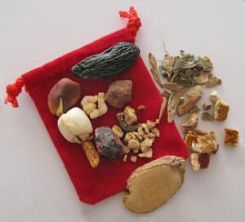
In order to become more sexually attractive to men find a small, red flannel bag and in it place the following:
–7 cardamom seeds,
–7 grains of paradise,
–aloes wood (oudh) powder or a small piece it,
-a chunk of dragon’s blood,
-a pinch of vetiver,
-a pinch of patchouli leaves,
-and a small lodestone.
If you’re a woman use a few drops of your urine or some of your menstrual blood as well as Come To Me Oil to anoint the bag. If you’re a man, use a few drops of your urine or semen and 7 Machos Oil or oudh oil to anoint it. Put this together on a Thursday when the Moon is waxing. Light a candle and face East and invoke your desire by burning aloes wood, dragon’s blood, and cardamom over a live coal. Hold the loaded bag in the smoke as you call out your desires and wave it in and out of the flame of the candle 7 times. Wear either aloes wood oil, 7 Machos Oil (if male), or Come To Me Oil. Carry the bag with you at all times. Chew cardamom seeds and/or grains of paradise whenever you are speaking with men you’d like to attract to you.
A friend recommends swapping out at least one of the ingredients listed above, (other than the loadstone), with something “softer, more feminine” to “balance the alchemy,” this being important “especially for the girls. But the boys would be smart to think about it too.” Sandalwood, jasmine, rose, gardenia, ylang-ylang. “Also, try to enjoy the men you attract. For goodness’s sake!”
Bath of Attraction
Take a large amount of orange tree leaves and blossoms and in a large basin of pure water shred them up so that the scent is released. As you macerate the leaves, concentrate and talk out loud your desires. Take the water, leaves, and flowers, pour it all over your head and, soaking your entire body, then rub the leaves and flowers all over yourself leaving no part unwashed. Again, concentrate and talk out loud your desires. Do not towel dry, let the water dry on the skin. Do this when the Moon is waxing.
Care must be taken to not let the flowers and leaves clog the drain of your bathtub. If possible, this bath is best done outdoors letting the water and leaves to flow off where they will. If you bathe in a tub, gather up the leaves after the bath and put them in a paper bag and throw them out into the bushes somewhere. When you toss the bag, concentrate and talk out loud your desires.
To Remove a Tyrant:
Make a Vow with Thunder and Lightening
Procure a red ribbon. Go to a tall tree or some other place likely to be struck by lightening, a hillside, a bell tower or cathedral tower, and find a place there where you can tie the ribbon. You can choose some spirit to help you: Shango, Thor, Saint Barbara, Oyá, Jupiter or Zeus, or Xevioso, Athena or even Hekate, Shiva, Kali…or some other heavy hitter.
Call your chosen spirit to mind and then say:
God, give me the serenity
To accept the things I cannot change,
The courage to change the things I can,
And the Wisdom to know the difference.
Or, if you don’t like the 12 Step, Christian vibe the “Serenity Prayer” can bring up, recite the words of the pagan philosopher Epictetus:
Make the best use of what is in your power, and take the rest as it happens. Some things are up to us and some things are not up to us. Our opinions are up to us, and our impulses, desires, aversions—in short, whatever is our own doing. Our bodies are not up to us, nor are our possessions, our reputations, or our public offices, or, that is, whatever is not our own doing.
After reciting the prayer or Epictetus tie the ribbon onto the tree. Vow, in words spoken aloud, that each day, until your tyrant be overthrown, you shall find 1 thing every day that is within your power to work towards the removal of tyranny from your life and the lives of others. Vow that if you should forget your vow, upon remembering it, you shall simply begin again, not ceasing until freedom comes. Know that the Masters of the world may control all things, take all things from you, maybe even own the truth, but they can never take one thing from you. Remember that one thing, it is all that matters.
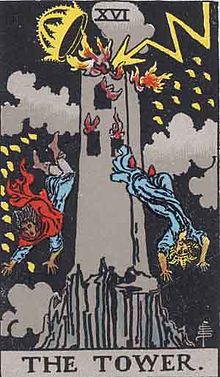
Anyone that knows me knows I hate taking recourse in divination. Nonetheless, every now and then I pull out the shells and get to it, or, even seek out an elder and ask them to let me have it. Talking with the Spirit is never a simple conversation, or it’s way too simple. Either way, there’s always work to follow. Being lazy, I avoid it like the plague.
Today I sat down and had a little conversation. Here’s what came out.
Ogbe’yeku. Light goes to visit Darkness. Progenitor of all combinations, all possibilities. This is the story that’s told:
Agemo, the chameleon, child of the earth, the forest, a creature of the land, a home boy cousin of those of us here in the realm of the senses, princeling of Oshala, the spirit of the light, the reasonable, the moral and patient, lord of what’s lofty, soft, with a genius of gentle determination, was called to go pay tribute to Olokun, to submit to power from beyond.
Olokun, the spirit of the deep, the dark, the watery unknown of the bottom of the oceans, here portrayed as the lord of the foreign, the wealth and control of the colonizer, the exotic and amazing, techie import with all the means of greater force, superior technology and gizmos, commander of international trade agreements, etc. etc., he was determined to rule the whole planet, his dominion would take over everything. What would happen to the forest? To little chameleon and all the people of the land?
Agemo was feeling small and insecure, he feared going to see Olokun and he feared even more Olokun’s agenda of worldwide takeover. Agemo went to his elders versed in the perennial wisdom of gratitude, the mysteries of Igi Ope, Ifa. They told him “Just be yourself.” They told him to offer all his clothes as a sacrifice and to go naked to meet Olokun. They told Agemo to challenge Olokun at the first chance he got. They told Agemo to pack a big lunch, “Hunger is a horrible thing; it can stop you cold.” While this made absolutely no sense to the timid chameleon, he did just as he was told.
Agemo went under the waters to the shadowy stronghold of Olokun. He knocked as hard as he could on the door. Surprised at such rudeness Olokun opened the door. Agemo said, swallowing the lump in his throat, “Olokun, wealthiest and most powerful of spirits, I challenge you to any contest of your choosing.” Olokun, ever vain and loving a chance to show of his power and majesty, said, “OK. A fashion contest. Whatever I wear you must wear something better. You lose, I take all the land of the world as my own. You win, I’ll stay put right were I am, my shores will rest at the border of the beaches.”
Olokun began. He put on one fabulous outfit after another. Miraculously, the chameleon matched his colors, his naked skin a perfect mirror of whatever Olokun could come up with. Each time Olokun put on his wealth, his foreign made clothes, his power and splendor, little Agemo was wearing just the same. Olokun was undone, “How on earth did this poor little reptile top me? I who command the seven seas and all the wealth of they bring?” Olokun declared, “You won the contest, fair and square. Problem is for you, you’ll never make it out of here alive.” Olokun summoned his mafia of sorcerers and sorceresses, all those people in the world who machinate the suffering of others, who hunger after our innards and thirst for our blood. Evildoers who lurk in all places and all times. “Don’t let that nasty lizard out of here.”
Agemo ran in terror. What would he do? His elders said nothing about this; chameleon thought he was doomed. “They’ll eat me alive!”
Agemo suddenly remembered the lunch he was carrying, a calabash filled with mashed roasted yams. He threw it behind him, between him and the gang of sorcerers. Chameleon sang:
Oso ibe e jowo mi
Aje ibe e jowo mi
Bi Igun ba j’ebo a jooegba
Sorcerers around here leave me be
Witches around here leave me be
Just as a vulture eats this food
It leaves the calabash be.
The sorcerers and sorceresses fell upon the food chameleon had thrown at them and fought each other over each little bit of it. Meanwhile, chameleon made his escape.
This is how mighty Olokun, more powerful than the creatures of the land, lost his agenda to take over the world back in those mythic days when we worshipped the trees.
Now, again, the ocean threatens to rise above the beaches and all the sorcerers and sorcerers of the world nibble at our insides. It’s season after season of greed, takeover, eviction, war, forced immigration, persecution, prejudice and murder.
What will happen to little chameleon, gentle child of the forest?
What will happen to the forest? What can the people of the land do to keep the oceans at the shore?
Go naked with nothing but your fear and a homemade lunch.
Go with audacity and challenge. Go adapting yourself at every setback.
Go using whatever they’ve got against them.
Go singing. Go giving evil a free lunch.
Go making your escape. Go making a way out of no way.
Otun ~Sinuka ~ Kuya
The Water Pot
In every Orisha shrine, and in just about any ceremony or ritual in our traditions, there is always a small container of fresh water set out. A gourd, a clay vase, cup or bowl, even a glass or jar, always with water. While most of the time it just sits there, the water slowly evaporating, it is also used to make libations. Usually, these libations are made quickly, with mumbled, quiet prayers breathed over them as a prelude to other, more elaborate and noticeable rituals, such as divinations and consultations with the Spirit through Elegbara and Ifa, or the often boisterous, jubilant ceremonies and celebrations so appreciated by ourselves and outsiders to the tradition, or the secret, hidden rituals known only to elders, witnessed by few others. In all this, one hardly notices or remembers the little pot of water.
Yet libation is the first and primordial act of our religion.
Almost all of our rituals begin with making a libation. Pouring or sprinkling water from a small vessel, while remembering aloud the names of those who have brought us to being we call for safety, security and blessing. Libation, a pouring out of water upon the ground, repeats the first act of Creation, the fecundation of Earth by Water. Libation recalls rain after draught, semen entering the womb, the arrival of Spirit into matter, consciousness to unknowing, the remembering of ancestors and Deity by their children, the giving back to Nature by humans, and thus, the Self making meaning of existence.
In Brazilian Orisha traditions we use clay vases or water jars to hold water we offer to the Orisha. Such a jar or pot is called a cuarta, (when larger) and quartinha (when smaller.) Quarta means “a quarter” or “a fourth,” so it’s like calling the pot a “quart” in English. Such ceramic jars follow traditional designs and are also called moringas, a uniquely Brazilian word derived from the Kimbundu word moringi meaning a pot for holding water. Usually made of terra-cotta clay or of porcelain, sometimes made with handles, mostly without, sometimes provided with a lid, sometimes not, they are almost always wide mouthed and rounded. In the Vodun traditions the water pot is called sinuka, a Fongbe word. In the Angola, Kongo, Bantu traditions the gourd for water is called kuya. Within the practice of African traditions in Brazil every shrine or place of spiritual practice, wherever the Spirit is thought to rest or is invoked to be present, will have a quarta or quartinha put there, almost always full of water. In Cuban Lukumi tradition this practice also exists; there they use a small gourd called a jícara.
Libation, like most magical, spiritual acts, is contradictory, paradoxical. In offering water or other beverages, we end up giving only what isn’t really ours. We have nothing in and of ourselves that doesn’t come or inevitably go to the Spirit. So how can we offer something to the Spirit? Like the water poured out in libation all life flows in and around us and can never really be held for long. The water pot represents that moment of holding which we humans like to dream of as being eternal, yet, like the body holds the fluids within it, in truth, there is constant evaporation, refilling, seeping and pouring out. It’s never still, never staying. (Some only fill a quartinha 3/4 full to approximate the ratio of fluid in the human body to flesh and bone.) The reserving and offering of water to Orisha affirms this natural fact of existence and making libation is acknowledgement and celebration that giving is having, that one gains oneself only in going with the flow.
Water makes clean, quenches thirst, gives life. Water brings coolness, peace, serenity, beauty. Water washes all away. Water returns.
Omi o l’ota o.
Our traditions teach that without water we have nothing.
Without water we are just dry earth, dust, inert, lifeless matter. It is said, omi o l’ota o, “water has no enemy.” Everyone loves water because it is essential. Yet water is probably also our fiercest enemy; too much of it and we are washed away, we drown, and yet, with not enough of it, we wither and die of thirst. Only in the right relation with water do we exist. While water’s presence may at times be problematic and difficult for us, even drowning us, its complete absence is worse. It is the same with the Spirit; we exist and are happy only in right relation with the Spirit.
With water our life begins and thus only with water can our worship begin.
Water, for us, is the emblem of right relationship, of harmony and balance; embodiment of divine generosity which creates, sustains and destroys our lives. Water is the symbol of the formless womb of possibility from which all things constantly spring forth. Thus, in almost all of Africa, water is not only a requisite ingredient to almost any and all rituals, it is also primary and fundamental; water comes first. Our formalities always begin with the sharing of water. All other ritual acts are either an elaboration of our initial libation of water or they bear some relationship to this initial gesture, conditioning the reality it invokes, adding or subtracting some element of water’s initial invocation of life. It is no exaggeration to say that the whole of our tradition is born, flowing from the libation of water.
Omi tutu Cool water
Ona tutu Cool the road
Ile tutu Cool the home
In old, pre-modern West Africa, as in much of the world in the not-really-so-distant past, the day began with a walk to the well to bring fresh, potable water into the home. The only activity which may have preceded it was the sweeping out of rubbish from the previous day. Nonetheless, the primary, first act of beginning a new day, after pushing off the day before, was to go fetch water. In our initiations and in the daily life of Vodun or Orisha shrines, (as well as in rituals marking the passing of weeks, months, and annual celebrations) this act of gathering water is still the first step in our initiation and its liturgies. In shrines, usually performed by women, in silence, the daily walk to the well or stream is heralded by the ringing of sacred bells to let anyone around know to not disturb this holy act. The return home with new, fresh water, symbolizes the continuity of life and well-being and, during annual festivals, is one greeted with joyous acclaim upon its completion. One must remember that back before the miraculous, technological convenience that is modern plumbing, obtaining sufficient water for drinking, cooking and bathing was usually not an easy task and certainly not one taken for granted. Whole civilizations could rise and fall with the a change in water’s appearance. If a well went dry, if the sky didn’t rain, if the river changed course, well, your whole life changed.
We went to the water and not the other way around.
In the Yoruba diaspora to the Americas the water pot used during the course of a new priestesses (iyawo) initiation is called the otun. In Yoruba language this puns on the word ọtun meaning “renewal” or “newness.” It is not surprising that we see the new life of the iyawo, the renewal of the Spirit in her life and in her community, start with the journey to go bathe at the river or well, washing away her old life, and then gathering up fresh water to walk it back home in the otun to begin her new day, her new life married to Orisha.
So while during the “normal” days in the present industrialized world our relationship to water is one of use and abuse, with water just being something taken for granted, another thing we use, our relationship with the Spirit, however, remains as it was when our foremothers made their daily hikes to the river to seek water and life: we sing and dance when it rains; pray when the dew falls. We go to the Spirit, seek life in its cool, quiet waiting presence. We rise and let go of the previous day to go out into the wee light of dawn to find it, fading sleep and dreams seeping into the hard earth of reality as daylight climbs forth. We draw the water/spirit up with our strong arms, balance it upon our heads and shoulders, walk it back home for ourselves and our loved ones, feeling its weight heavy on our heads.
We do not waste it.
Back in the day, if someone came over you always offered them water. In Orisha tradition it remains the same. Our first gesture of hospitality and love for others is expressed in sharing our water, in giving a bit of what we have of the Spirit. A traveler or guest arrives from outside in the heat, we bring water and greetings, seat them in a cool place to rest. This is the truth of libation, its mystery. We go to the Spirit and the Spirit is in us; there is only this flowing forth, this sharing of the essential goodness of water, Spirit. Water evaporates, precipitates, flows away again. So, really, there’s just the sharing.
Again: rain upon dry earth; living spirit seeping into the inert, the material; blood coursing in the veins; semen coming into the womb; our tears awakening the compassion of the beloved.
Back in those ancient days when we worshipped trees there was little separating daily chores from holy practices and mysteries; it was all one, of a piece, unity pervaded and eroded all divisions. Remember this when filling your water pot, gourd or jícara. Remember too that the waters of the Earth are at present in danger. Ecological disaster looms. Our religion is thus in danger, as is our lives. Water has no enemies. The only enemy then, is ourselves.
No separation. Just as water flows through and comprises the mass of your body you will, like a drop of rain, one day flow back into the salty, heaving tides of the ocean, returning to the Spirit that you’ve never really left. Remember: your only separation from the Water Mother’s womb is in your mind, which is in your body, which is in her body, her mind, her heart. No separation. You are more the water/spirit more than you are you. Long after you are done being you, you will be water.
Take care of yourself. Make no enemies.
O iya omi n’ibu
Omi ro d’orisha
O ‘lele.
Go take a bath, feel the water washing you clean, let the past go, let go of worries and preoccupation. You can come clean.
If you do nothing else, have nothing else, just get a small container of water and pour or sprinkle some out on the ground or floor in front of you. Pray. Pray to whatever you like, however you like. We usually call the names of those who brought us here and then name all the forces of good in our lives; we remember the limitless, unending Creator that is as inseparable from creation as wet is from water. Even if you have no faith, know no ancestor or deity, just open your heart and speak, let it out. Speak to the eternity of creation, what some call Nature, this reality you just remembered and took part in by pouring out a little bit of yourself into the world. Take a sip of the water. You’ve given into the Spirit and the Spirit has been poured into you. From this point you can begin again.
This is our religion. All the rest we can teach you is a belaboring, elaborating just this one act; all the rest is fanciness.
A friend of mine asked me last Sunday about “meditative” or “contemplative” practices in Candomblé or Orisha practices in general and also asked about the nature of “possession” or “trance” that is such a notable hallmark of our tradition. I found this old piece I’d written and thought I’d post it.
Trance: A River without Shores
“Be soft in your practice. Think of the method as a fine silvery stream, not a raging waterfall. Follow the stream, have faith in its course. It will go its own way, meandering here, trickling there. It will find the grooves, the cracks, the crevices. Just follow it. Never let it out of your sight. It will take you.” —Sheng-yen
Our ability to receive and give the Spirit, as well as our understanding of this process and what it means in our own lives, and in life’s wider breadth, begins as a trickle. It starts as the condensation of dew or the merciful dripping of rain and gathers in small pools at first, under leaves or in secret caves far underground. These are our dreams and yearnings, the Spirit’s soft balancing of our inner fears and thwarted needs; tenderly our seeds of hope are watered off-handedly with the generosity of the Spirit. Slowly this moistness gathers, grows, and begins a tentative flow. Small streams, curious conversations and questions, in rituals a sense of coming home, the finding of new friends and soul-mates, reading an inspiring text, or a sudden revelation, the Spirit begins. In all these little things, the Spirit gathers possibilities. Streams flow and converge and Spirit becomes a stream but not without seemingly false, failed starts, or frustrations to the water’s flowing. Sometimes the water appears to dry out, to disappear, but in reality just having sunk underground it will surface later as if some other stream altogether. Sometimes the Spirit sits still and perfected in lakes and ponds, offering its grace of fish and water to all around. Sometimes she gushes forth as a spring out of the desert offering a miraculous and impossible salvation to us and everyone. Regardless, the Spirit flows and this movement is our source, our life.
In the trance that manifests during our rituals there is a particular convergence of the Spirit, another, unique place where waters meet. These trances are the blood of the Spirit and while watching the medium’s dance, gestures, and words we can feel its pulse. There pours forth from the presence of the Spirit in the trance a harmonious growth in the medium, the community, and the Spirit. It is a bonding, a commingling, and a wedding. Out of this union the Spirit flows, it births. Yet each must be willing to give and receive, to surrender and to grow. This is the difficult work of our tradition. This is the lingering message sent to us, like a leaf in the wind or a stone from the bottom of the water: to be willing to give in order to open to a fuller blessing. “A full hand can grasp nothing more; only by giving can we receive.”
We speak at once of the Spirit and “the spirits.” When we speak of the Spirit in a singular, capitalized way, we speak of the unity of all being, the force, creativity and continuity that this implies. When we talk of spirits, plural and lower case, we speak of any of the myriad aspects of the Spirit, living and dead, historical or fictional, embodied or disembodied, abstract or imminent. In our tradition we have whole tribes of spirits that come to us in our rituals, each a wave of the infinite, ever connected, Water that encircles the globe. Each spirit unique while part of the singular, One, unique only to Itself. We are accused of idolatry and small-mindedness, but how can we not praise the Spirit in all its parts and manifestations? Is it for our ‘small minds’ to decide what is holy and what is not when the Spirit makes and unmakes all things? We do not judge the tides, merely learn to swim accordingly.
The medium’s work is to learn to give. For some, the art of giving in/to the trance may come quickly while for others it is a labor that can last a lifetime; it is a raindrop’s long path from mountain clouds to the ocean. There is also the splashing over of the flow within the ritual trance into the wider current of the medium’s every day life; it can be a slow permeation and gradual solution into the medium’s self, taking time to wash back into the community. With the spirit’s first seeping touch it starts with an inevitable grain of selfishness or vanity, shame or confusion. This is just the medium adjusting to a forgotten way of being. We become afraid for ourselves as we learn that things are not as we had thought: that we are not as we thought. We begin to understand that for our self to come into fullness, to live, for the Spirit to come forth and dance in our spirit, we have to give up what we have thought of as our self. In some particular time and place we have to struggle to become willing and able to be washed away. It is natural to resist this process or to try to manipulate it or to fake it or to feel fake in our struggle to become real. It is also difficult to remain responsible unto and as our individual self, even as we wallow within and are infused by a greater, Spirit without boundary. What small child doesn’t cry when first taken to the river to swim? Even as we seek it out, the “me” centered self creeps about sabotaging our every effort to give, or so it seems at first. The trance then, in such moments, is struggle. It should not be rushed or pushed, nor should it be avoided, trivialized, or put aside. There is no worry either way, the river carves its own banks and not even the densest, hardest stone remains a barrier to water’s constant push. The river is a warrior, and one that always wins.
As we experience the Spirit in trance we begin to feel the perennial nature of spirits’ approaches, becoming part of our “everyday.” The ego gets used to the spirits coming and going and, relaxing, it begins to “stand back,” to give over more easily. As this occurs the spirits’ ability to pass through the medium, using, strengthening, firming, and nourishing the medium grows, while simultaneously doing the same to the community, and to the spirits themselves. We see this process throughout existence, in the interdependence of species within ecosystems, in the delicate functioning of cells within the body. The medium also usually learns here to take care of their body, mind and heart; with a new, healthier set of boundaries and commitments, she becomes mature and more capable of detached, equanimity and compassion. The river is a mother that cares for her children and these, in turn, care for her.
Initially, however, in the relationship between the medium and the spirit we see much fumbling as the medium and the spirits adjust to each other and eventually find their harmony. It is easy to see the mediums’ personal defects and foibles manifest in the alleged actions of the spirits as they begin to act through the medium. This should be gently accepted, almost ignored, countered by engaging both the spirit and medium appropriately, emphasizing their healthy manifestation in relationship to the community. This provides a challenge to the triad of medium/community/spirit and will always remain dynamic, even if eventually it eases into a more settled, productive relationship. We are reasonable to be afraid and only slowly become more willing to splash about in the water and eventually dive and swim, even attempting the Other Shore.
As the river approaches the sea her broad waist is beyond the eye’s ability to embrace her far banks. She is immense as she marches, the Amazon, the Niger, the Nile or the Mississippi, her watery waistline wide and impossible, fantastic. We are like an infant in her belly, floating unaware. Even when born into her arms we will always feel almost powerless facing her relentless currents. Yet even she splinters and diverges, can sink and get lost in swamps before becoming wide, boundless ocean. Trance can seem to mystify and obscure, deluding and corrupting the Spirit’s integrity, yet in the end, it always arrives to the sea. Water pours into water as what was lost or looked over is found, cherished. We find that our self-attachment, our egotism, our fears, and our ignorance are all washed clear…that they are all silt carried by the water itself, used by the water to provide fertile ground, to move and establish banks, to carve and erode what stands in its way.
This is how the spirits move us and this is how we move within the Spirit, waves rising and sinking, emerging and immersing, full of so much filth gathered in the flooding yet carrying it away, purifying, becoming possible, fertile. Each wave is distinct and yet part of a whole beyond our mind’s briefest understanding, a drip of falling rain splattering into the continually evaporating ocean.
I learned today that one of my teachers of Candomble traditions passed away. I feel a bit shaken, not sure of what to say, who to reach out to, to console or be consoled; to speak to the absence and bring her closer, dispelling a distance which feels too real or to stay silent, letting the absence remain, holding on to what feels unreal, but isn’t.
I’m learning that the Dead aren’t our ancestors just by their great deeds, morality, or lived example, nor by virtue, not by spiritual power or by any worldly importance. Ancestors are such just by their having been here, with us. My greatest teachers have been those whose every word and gesture, whose essential teaching, did not necessarily impart any brilliance, success, civility, ethics or purity, nor come about by any generosity of heart or ebullience of character, but rather, was there all along, and remains here still, flailing in and drawing attention to, the gaping, sometimes aching, distance between the real moments we shared and the ever widening, looming, begging opportunity for all the things we wanted to be, should have been, could have been, and still must become. Yearning.
Yearning: the desire for all that is beautiful, fun, right, true, noble, silly, sexy, easy, spiritual and tasty, kooky, kinky, radical, rebellious, righteous, sinful, dear, damnable, and undreamed. Yearning is what makes ancestors, gods; agba, orisha. Yearning is what makes us friends, teachers, students, survivors, lovers, humans.
Mo’ku o egbon mi. Imole laelae.